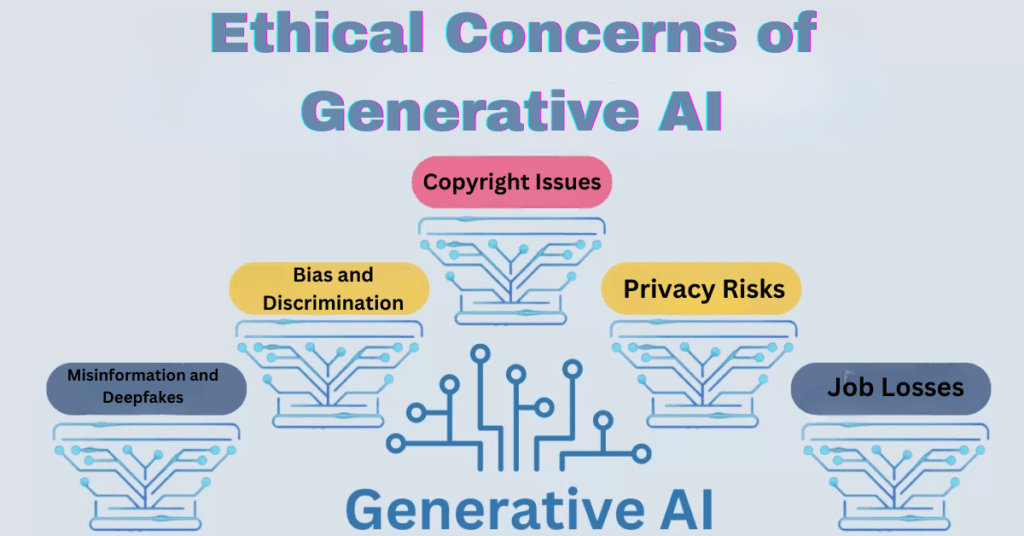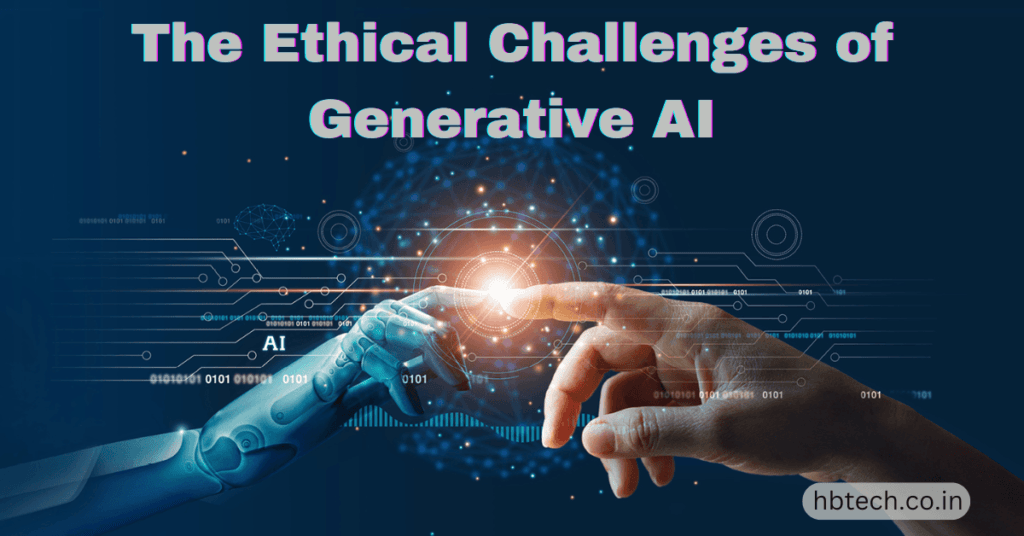Generative AI is a fascinating part of artificial intelligence that can create things like images, text and even music. While it’s incredibly useful, it also brings many ethical concerns that need attention. In this article, we’ll look at these concerns, the risks they pose and why it’s important to address them.
Ethical Concerns of Generative AI

Generative AI has raised a lot of ethical questions as it becomes more common. Here are some of the main issues :
- Misinformation and Deepfakes : Generative AI can create fake videos or images (deepfakes) that can mislead people, manipulate opinions or harm reputations.
- Bias and Discrimination : These systems often reflect the biases in their training data, which can lead to unfair or discriminatory results.
- Copyright Issues : Generative AI can replicate existing works without giving credit, leading to concerns about intellectual property rights.
- Privacy Risks : AI systems might accidentally reveal private or sensitive information, especially if trained on unregulated data.
- Job Losses : Automation powered by generative AI could replace jobs in creative fields and other industries, leading to economic and social challenges.
- Lack of Accountability : It’s often unclear who should be held responsible for harmful outputs from AI systems since they’re so complex.
Ethical Concerns in AI-Human Interaction
As generative AI interacts more with people, like in chatbots or content creation tools, new ethical questions arise :
- Trust Issues : People might not know if something was created by AI or a human, which can lead to a loss of trust.
- Emotional Manipulation : AI could unintentionally exploit people’s emotions, for example, in advertising or customer support.
- Over-Reliance on AI : Depending too much on AI for decisions or emotional support could weaken critical thinking or human relationships.
Addressing the Risks of Generative AI
To tackle these challenges, we need to work together—researchers, governments, developers and users all have a role. Here are some ways to reduce risks :
- Stronger Regulations: Governments need to set rules to ensure AI is used responsibly and fairly.
- Diverse Development Teams: Including people from different backgrounds in AI development can help reduce biases.
- Transparency: Developers should make AI systems more understandable so users know how decisions are made.
- Public Education: Teaching people about AI’s strengths and limits can help them use it wisely.
Common Ethical Concerns of AI (Quiz Style)
- What is a key ethical concern of generative AI?
- A) Creating jobs
- B) Violating privacy
- C) Boosting transparency
- D) Encouraging creativity
- Which of the following is NOT an ethical issue related to generative AI?
- A) Deepfakes
- B) Environmental harm
- C) Bias in outputs
- D) Building trust
- How can we address ethical challenges in generative AI?
- A) Ignore biases
- B) Increase transparency
- C) Avoid accountability
- D) Limit public awareness
Generative AI is an amazing technology that can bring many benefits, but we also need to be mindful of its risks. Problems like misinformation, bias and lack of accountability need to be addressed. By working together and being responsible, we can make sure generative AI is used in ways that benefit everyone.
Frequently Asked Questions(FAQs)
What are the main ethical concerns of generative AI?
Generative AI raises several ethical concerns, including the creation of misinformation and deepfakes, bias and discrimination in outputs, copyright and intellectual property violations, privacy risks, potential job losses due to automation and the lack of accountability for harmful AI outputs.
How does generative AI impact trust in human interactions?
Generative AI can create content that is indistinguishable from human-created work, leading to trust issues. People may find it difficult to determine whether a piece of content was generated by AI or created by a person, which can erode confidence in what they see or hear.
What steps can be taken to reduce the risks of generative AI?
To reduce risks, it’s important to implement strong regulations, involve diverse development teams to minimize biases, improve transparency in AI systems and educate the public about AI’s capabilities and limitations.
How can generative AI affect employment opportunities?
Generative AI has the potential to automate tasks in creative industries and other fields, which may lead to job displacement. While it can improve efficiency, it also raises concerns about economic and social disruptions for workers in affected industries.
Related Posts
- How to do Paytm Full KYC || From your mobile at home
- What’s app Privacy Policy : What’s App got angry || See what What’s App said…
- WhatsApp Banking : How to Check Bank Balance Through WhatsApp
- How Many SIM Cards are Activate with my Aadhar
- Exploring the World of ChatGPT: A Comprehensive Guide
- Canva: Your One-Stop Shop for All Things Design









